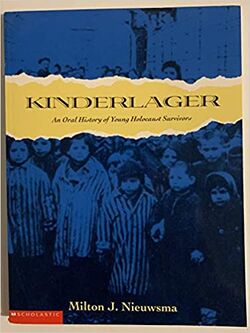Frieda Grayzel / Frieda Tenenbaum (F / Poland, 1934), Holocaust survivor
Frieda Grayzel / Frieda Tenenbaum (F / Poland, 1934), Holocaust survivor
- <Tomaszów Mazowiecki Ghetto> <Auschwitz> <Liberation of Auschwitz> -- <Australia> <Israel>
- MEMOIRS : Kinderlager (1998), by Milton J. Nieuwsma
Biography
Frieda Tenenbaum Grayzel was born in Poland in 1934 and was five years old when Nazi Germany invaded and occupied her country. Her family fled their hometown for Poland’s capital, but after the bombardment by the German military, they returned home and were interned in the Tomaszow ghetto. The family – with her sister Dorka who was born in Warsaw on September 7, 1939 – were taken to the Bliżyn labor camp, where Frieda’s four-year old sister was taken away and killed. After her father was deported for camps unknown, Frieda and her mother were deported to the Auschwitz-Birkenau concentration camp. Out of more than one million people sent there, she is one of only a few hundred children who survived. Frieda has worked as an arts administrator and as a social worker and psychotherapist, and has also spent years sharing her story to younger generations.
Book : Kinderlager (1998), by Milton J.Nieuwsma
A retelling of the experience of Tova Friedman, Frieda Tenenbaum, and Rachel Hyams, thrre of the youngest survivors from Auschwitz.
"As time begins to silence the first-person voices of older survivors, this account of the experiences of three young girls, one of them possibly the youngest survivor of the death camp of Auschwitz-Birkenau, comes as a powerful witness to the Holocaust. Tova Friedman, Frieda Tenenbaum, and Rachel Hyams all came from the same small town in Poland. After a series of ghettos and forced labor camps, all three girls were transported to Auschwitz with their mothers and for a time were together in the Kinderlager barracks-the children's section. By a twist of fate, when the final Nazi cry of "Alle Juden raus!" echoed through the camp, each of the girls was hidden by her mother instead of joining what was for many a death march. On January 27, 1945, the date of their liberation and, subsequently, the date celebrated by the three women as their "birthday, " Tova was six years old, Frieda was ten, and Rachel was seven. Nieuwsma, a journalist, assembles the sometimes brutal oral histories of these women from childhood through liberation and the aftermath of displaced persons camps, the often futile search for scraps of information about surviving family, and the difficult decision to emigrate. In the story of each woman's adult life, there is a resurgence of hidden memory and post-traumatic stress; Tova speaks of "existential loneliness" during every holiday, Rachel of her never-ending search for "missing pieces, " and Frieda recalls that "if you cried in the war you were dead...But I can do it now, and it's a precious thing." The photographs of these women with their children and grandchildren are a testament to their strength and to the capacity of the human spirit to survive. Their intensely moving stories are a remarkable gift of insight to the Holocaust years and its implications for all of us."--Publisher description.
